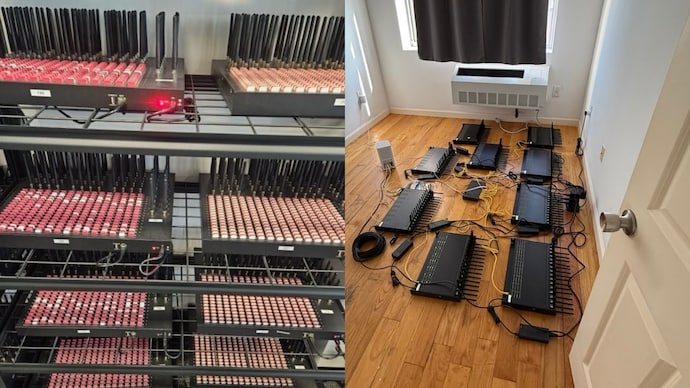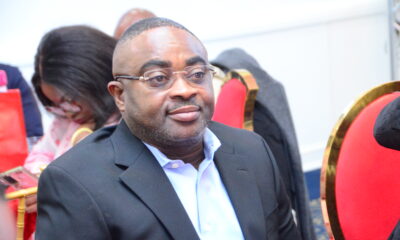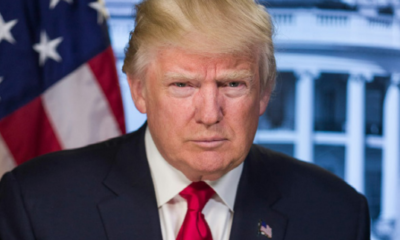Tech
Secret Service Foils Telecom Plot to Cripple New York Networks

Secret Service Foils Telecom Plot to Cripple New York Networks
The United States Secret Service has disrupted a sophisticated telecommunications network capable of shutting down cellular systems in New York City as world leaders gather for the United Nations General Assembly (UNGA).
The agency disclosed on Tuesday that, in August, it discovered more than 300 SIM servers and 100,000 SIM cards in parts of New York, New Jersey, and Connecticut.
“This network had the power to disable cell phone towers and essentially shut down the cellular network in New York City,” said Matt McCool, a special agent in charge of the operation.
Officials said the devices were uncovered within 35 miles (56km) of the UN headquarters, where over 100 world leaders and delegations are meeting for the 80th UNGA anniversary.
McCool described the operation as a “well-organised and well-funded scheme” linked to nation-state actors, organised crime groups, cartels, and terrorist organisations.
Investigators believe the equipment could send text messages to the entire US population within 12 minutes, disable mobile towers, and even disrupt emergency communications through denial-of-service attacks.
The Secret Service confirmed that the equipment was seized from SIM farms operating out of abandoned apartments spread across at least five sites, though exact locations were not disclosed.
According to officials cited by the New York Times, the discovery followed an investigation into telephonic threats directed at three senior US government officials earlier this year—one from the Secret Service and two from the White House.
CBS News also reported that agents recovered 80 grams of cocaine, illegal firearms, computers, and mobile phones during the raids.
The Secret Service said investigations are ongoing as leaders converge in Manhattan amid heightened security concerns.
Business
Tesla Loses Top Spot as BYD Overtakes in Global EV Sales

Tesla Loses Top Spot as BYD Overtakes in Global EV Sales
Tesla has reported lower-than-expected vehicle sales in the fourth quarter of 2025, losing its position as the world’s largest electric vehicle (EV) maker by annual sales to Chinese auto giant, BYD.
The American EV manufacturer, led by billionaire entrepreneur Elon Musk, said it delivered 418,227 vehicles in the final three months of 2025, bringing its total deliveries for the year to about 1.64 million units.
In contrast, a day earlier, Shenzhen-based BYD announced that it sold 2.26 million electric vehicles in 2025, overtaking Tesla to emerge as the global market leader in EV sales.
Analysts had projected a stronger performance from Tesla in the fourth quarter, with a FactSet consensus estimating deliveries of about 449,000 vehicles.
The shortfall has heightened concerns over slowing demand for electric vehicles, particularly in the United States.
Industry analysts noted that the removal of the $7,500 federal EV tax credit at the end of September 2025 has continued to weigh on consumer demand in the US market, with the sector yet to find a new equilibrium.
However, observers point out that Tesla’s sales challenges predated the policy change, as the company had already been struggling in some key markets.
This, analysts said, was partly linked to the political activities of its chief executive, Elon Musk, including his public support for US President Donald Trump and other far-right politicians, which reportedly affected consumer sentiment.
Tesla is also facing intensifying competition from Chinese manufacturers, particularly BYD, as well as from established European automakers ramping up their EV offerings.
BYD, which produces both fully electric and hybrid vehicles, on Thursday disclosed that it recorded its highest-ever EV sales in 2025, underlining the growing dominance of Chinese firms in the global electric vehicle market.
The development signals a major shift in the rapidly evolving EV industry, with analysts predicting stiffer competition and further pressure on global automakers in the coming year.
Tech
China Accuses Nvidia of Monopoly Breach Amid Renewed US-China Trade Talks

China Accuses Nvidia of Monopoly Breach Amid Renewed US-China Trade Talks
China’s State Administration for Market Regulation has accused American chipmaking giant, Nvidia, of violating the country’s anti-monopoly laws, a charge that underscores the deepening strategic rift between Beijing and Washington over control of the semiconductor industry.
Although the regulator stopped short of disclosing specific details of the alleged violations, it confirmed that its investigation into the company would continue.
The announcement coincided with the second day of high-level trade talks between officials of both countries in Madrid, Spain.
Leading the negotiations were United States Treasury Secretary, Scott Bessent, and China’s Vice Premier, He Lifeng.
At the end of the discussions, Bessent struck a positive note, describing the exchanges as “very good,” while disclosing that a fresh round of talks would be held next month.
The Madrid meeting also broached the issue of TikTok, the Chinese-owned social media platform facing the threat of a US ban unless it is acquired by an American entity.
US President Donald Trump hinted at a breakthrough, writing on his Truth Social account that “young people… will be very happy,” and promising further conversations with President Xi Jinping later this week.
The accusations against Nvidia mark another flashpoint in the ongoing technological rivalry between the two powers.
Washington has tightened restrictions on advanced chip exports to China, citing national security concerns, while Beijing in turn opened its probe into Nvidia last December—moves widely interpreted as tit-for-tat economic retaliation.
Semiconductors remain at the heart of the geopolitical contest.
Analysts say the Madrid talks were expected to weigh heavily on the future of chip supply chains and market access, given the role of Nvidia’s processors in powering artificial intelligence and high-performance computing worldwide.
Diplomatic watchers note that while both sides are keen to project progress, the combination of regulatory investigations, export controls, and looming political deadlines suggests that the competition for technological supremacy will define US-China relations for years to come.
Tech
Nigeria to Launch Four Satellites to Boost Security

The Nigerian Government has approved the launch of four satellites to aid observation and fight against insecurity in the country.
This was announced by the Minister of Innovation, Science, and Technology, Chief Uche Nnaji, at the 22nd National Council on Innovation, Science, and Technology (NCIST) in Abuja.
Diaspora Watch reports that the satellites include three Earth observation satellites and one Radar Aperture Satellite.
According to the Minister, these satellites will enable the military to effectively monitor and respond to security threats without relying on foreign image and data purchases, noting with these satellites, Nigeria will have greater control over its security surveillance.
The minister emphasized the need to bridge the gap between research and real-world impact.
He noted that valuable research conducted in Nigerian universities and institutions has often remained underutilized due to lack of support, financing, and mentorship for young innovators.
The minister called for a new approach, where every “research has a roadmap to industry, and innovation is commercialized for national prosperity”.
The launch of these satellites will not only enhance security but also promote research and development in the country.
It will create opportunities for youths to develop their skills and contribute to the country’s technological advancement.
The 22nd NCIST, which was themed “Research, Development, Innovation, and Commercialization: A Cycle for National Prosperity,” served as a platform for stakeholders to discuss the role of innovation and technology in driving national development.
The launch of the satellites is a significant step towards achieving this goal.
-

 Extra2 days ago
Extra2 days agoUS Veteran, Walter Obi Urges Compassionate Leadership at Valentine’s Event in US
-

 Diaspora18 hours ago
Diaspora18 hours agoZenith Bank to Host Diaspora Engagement, Banking Services for Nigerians in Texas
-

 Business1 week ago
Business1 week agoZenith Bank, Excel Global Media Discuss Strategic Partnership
-

 Analysis2 days ago
Analysis2 days agoIs Nasir El-Rufai on the Peril? By Alabidun Shuaib AbdulRahman
-

 News1 week ago
News1 week agoTrade, Tension as Trump Threatens US–Canada Bridge Opening
-

 News1 week ago
News1 week agoSenegal Police Arrest 14 in Transnational Paedophile Ring Linked to France











